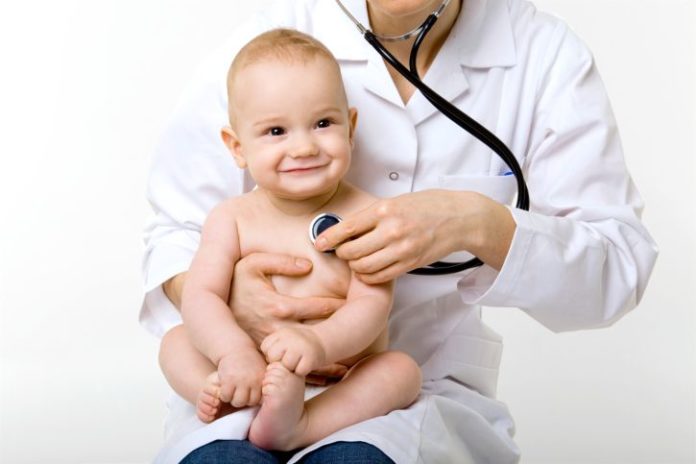When your baby’s symptoms are more serious than a blocked nose and slight fever, it’s important to see a doctor to check that another more serious illness is not causing their symptoms. But as a parent you’re probably wondering when symptoms are serious enough to book a doctor appointment.
Any time that your baby has symptoms which bother you or make you feel anxious, it’s a good idea to see a doctor. Even if they turn out not to be serious, at least you’ll get reassurance. But there are some signs which should sound the go-to-the-doctor alarm.
When to go straight to the doctor
See your doctor immediately if:
- Your baby is crying uncontrollably or will not calm down when you do the things that usually calm them down.
- Your baby is not nursing or drinking fluids or does not eat as much as they usually do.
- Your baby is listless, for example has no energy or interest in the things around them or does not respond to you because of weakness.
- Your baby is very lethargic, does much less then normal and sleeps much more.
- Your baby will not wake up or cannot stay awake when woken.
- Your baby is unconscious or has a decreased level of consciousness.
- Your baby appears to be having difficulty breathing, for example:
- Has difficulty swallowing;
- Is breathing too rapidly (babies under one year normally breathe between 30 and 60 times per minute);
- Is wheezing;
- Is flaring the nostrils with each breath;
- Sucks in the skin near the ribs when they breathe;
- Has shallow breathing;
- Is breathless;
- Chokes or has recently swallowed something which may be stuck in their throat;
- There are changes in your baby’s skin, for example a bluish tinge to your baby’s lips, mouth and/or nail beds, or a pale, grey or ashen tint to their skin.
- There is blood in the mucus your baby coughs up.
 Your baby’s cough is so hard it causes them to vomit.
Your baby’s cough is so hard it causes them to vomit.- Your baby is vomiting persistently.
- Your baby has a stiff neck.
- Your baby coughs during feeding.
- Your baby has a rash.
- There is puss on your baby’s tonsils.
You should also see a doctor if your baby shows any of the following signs or symptoms:
- Less frequent urination, which is a sign that your baby is dehydrated. If your baby does not urinate at all for a period of eight hours, go straight to the doctor;
- Crying but not producing tears is also a sign of dehydration in babies;
- A fever > 38.9oC;
- Ear pain, which may cause baby to pull or rub their ears;
- Puss in the ear;
- Red eyes;
- Sunken eyes;
- Dry lips;
- Yellow discharge from the eyes;
- A cough which lasts more than 1 week or gets worse after the third day of illness;
- Thick green discharge from the nose for several days.While this is not always a sign that the infection has worsened, it needs to be checked by a doctor.
If symptoms persist for more than two weeks, it’s likely that another problem, for example an infection of the sinuses, is causing them. Your child may require treatment to resolve these symptoms, which is why it’s important to see a doctor.
When to return to the doctor
If you go to the doctor when your child first gets ill and they tell you to ‘wait and see’, you should go back if:
- Their fever continues for more than three days.
- Their symptoms get worse after five days or they develop extra symptoms.
- They have not improved after seven days.
References
- Mayo Clinic. Common Cold in Babies- Symptoms. 2010. (cited 5 May 2013). Available from: (URL Link)
- Curtis GB, Schuler J. Week 10. In Your baby’s first year- week by week. 3rd 2010. De Capo Press. (Full text).
- Farrer Cold and flu in Children. South African Pharmacists Assistant. 2013; 13(1): 16-17. Available from: (URL Link)
- Snellman L, Adams W, Anderson G. et al. Institute for Clinical Systems Improvement. Diagnosis and Treatment of Respiratory Illness in Children and Adults. Updated January 2013. (cited 17 May 2013). Available from: (URL Link)
- Cough in Children. Best Practice Journal. 2010; 29: 20-29. Available from: (URL Link)
- American Academy of Pediatrics. Caring for your baby and young child- birth to age 5- the complete and authoritative guide. 5th SP Shelov & T Altman. Random House. USA. (Full text).
- NHS Choices. Common cold in children. 2011. (cited 5 May 20130. Available from: (URL Link)
- The Royal Children’s Hospital Melbourne. Know your child’s eczema. 1999. (cited 28 July 2012). Available from: (URL Link)
More information on colds in 3-12 month old babies
 |
For more information about baby colds and their causes, see Baby colds. |
 |
For more information about the symptoms experienced by a baby with a cold, see Baby cold symptoms. |
 |
For information about which babies are more likely to get colds and how to prevent baby colds, see Baby cold prevention. |
 |
For more information about how to comfort and look after for your baby when they have a cold, see Caring for babies with colds. |
 |
For more information about simple measures you can take to relieve the symptoms of your baby’s cold (and medicines you should avoid), see Baby cold remedies. |
 |
For a quick reference guide to baby colds, see Baby colds: 10 tips for parents. |




 (7 votes, average: 3.86 out of 5)
(7 votes, average: 3.86 out of 5) 






